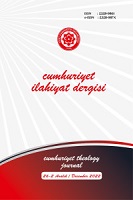Osmanlı Toplum Hayatından Fetvalara Yansıyan Boşama Yeminleri, İhlaller ve Müftülerin Önerdiği Hukukî Çareler (16.-18. Yüzyıllar)
Divorce Oaths Reflected in Fatwās from Ottoman Social Life, Oathbreakings and Legal Remedies Muftīs Suggested, 16th-18th Centuries
Author(s): Muharrem MidilliSubject(s): Social history, Social Theory, 16th Century, 17th Century, 18th Century, Sociology of Law, Sharia Law
Published by: Cumhuriyet Üniversitesi İlahyat Fakültesi
Keywords: Islamic Law; Ottoman Social Life; Divorce Oath; Muftī; Legal Remedy;
Summary/Abstract: This article discusses divorce oaths reflected in fatwās from Ottoman social life, oathbreakings and the legal remedies suggested by muftīs for annulment of the oaths. In the Hanafī legal tradition that guided the Ottoman family law, conditional divorce was considered legitimate and accepted as an oath. Divorce oaths made on triple talaq are very binding as they closely concerns the fate of the marriage union. In particular, breaking divorce oaths made on triple talaq does not require expiation like ordinary oaths, but rather requires an irreversible separation. For this reason, it was widely used in various areas of Ottoman social life, and it caused serious family problems. The relevant sections of the fatwā collections contain important data on the usage areas of divorce oaths and the family problems they caused. This article tries to describe the usage areas of divorce oaths and the ways to make them ineffective, based on the fatwas of muftīs who served in Anatolia and Rumelia between the 16th and 18th centuries. These centuries are important in terms of mirroring the formation and expansion of the most important examples of Ottoman fatwā collections and of deeply affecting the subsequent iftā activities. The questions directed to the muftīs shed light on the issues that occur in social life regarding divorce oaths. The answers given by the muftīs provide an idea about the policy followed by the legal system in the settlement of these issues. Many fatwās in the collections indicate that the divorce oath was frequently used by the husband in the marital relationship. In the Ottoman family, sometimes the divorce oath was used by the husband as a means to punish, restrain and discipline his wife. Sometimes, it was a strong promise to his wife that he will stay away from bad habits and violence and be a good husband. Sometimes it amounts to a precaution to prevent his wife from being a victim in case he did not return from his long journey. The divorce oath was used to reinforce personal decisions in various areas of Ottoman social life and to ensure the other party. Religious officials such as muftī, imām and muadhdhin; tradesmen such as bakers, butchers, slave traders and basket makers; ahl-i urf such as taxman, steward, janissary and sipahi and even qādīs took divorce oaths in their professional lives. The divorce oath has functioned as an oral guarantee in debt relations. Ahl-i urf, powerful men and qādīs used the divorce oath as a means of providing obedience for their legitimate or illegitimate demands. Especially divorce oaths made on triple talaq caused marriages to end unjustifiably, practicing temporary halala marriages and meanwhile, this also caused women suffer severe grievances. In fact, the Hanafī legal tradition, developed some remedies to mitigate the destructive effect of divorce oaths. The Ottoman muftīs most commonly used the remedies such as the power of procuration (wakālah), marriage concluded by unauthorized person (nikāh alfudūlī) and to break the oath after divorce and then remarry. The muftīs have issued fatwās that the spouses of those who took the divorce oath not to file a lawsuit regarding a certain issue will not be divorced if they file a lawsuit through the procurator they have appointed. This remedy was used against divorce oaths taken under the coercion of cruel rulers and powerful men. However, the procuration is not useful in legal acts where the laws turn directly to the client, such as marriage. Another remedy frequently suggested by the Ottoman muftīs to nullify divorce oaths is marriage concluded by unauthorized person. A person who has taken a divorce oath not to marry can be married by another person without authorization on his behalf. However, the person who wants to marry with this formula should not give instructions to anyone for marrying off and should accept the marriage with an action such as sending the dowry. Another remedy frequently suggested by Ottoman muftīs is to divorce the wife first, then break the oath and then remarry the ex-wife. The person who wants to use this remedy must first divorce his wife irreversibly, make sure that the oath is broken after the iddah ends, and then remarry his ex-wife again. All these legal remedies suggested by the muftīs alleviated the destructive effect of divorce oaths on the family unity, reduced the halala marriages and protected the people against cruel rulers and powerful men. In addition, they served to balance the legal system, which considers divorce oaths made on triple talaq valid even when drunk or under coercion, in favor of family unity. This article, which is a study of legal history, describes numerous fatwās on which these findings are based and interprets them in the light of the Hanafī legal doctrine.
Journal: Cumhuriyet İlahiyat Dergisi
- Issue Year: 26/2022
- Issue No: 2
- Page Range: 763-779
- Page Count: 17
- Language: Turkish

